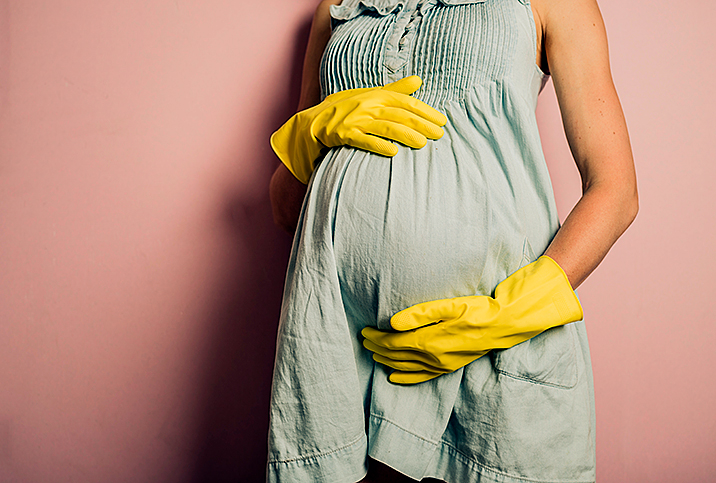Sex and Housework: Does the Division of Chores Impact Intimacy?

Who does more of the cleaning up around the house? The answer differs depending on the couple, obviously, but in many heterosexual relationships, the brunt of the household labor falls to the women. An inequitable division of labor can lead to arguments or unvoiced resentment.
That pattern has consequences that can spill over into the bedroom.
What does science say about household labor and thriving sex lives?
"Sex does not exist in a vacuum—it is mutually influenced and influencing. Something like domestic labor inequity can absolutely impact sexual desire," said Karen Washington, L.M.F.T., a certified sex therapist and the clinical director of Relationship Reality 312 in Chicago.
A connection between imbalanced household labor and sexual desire makes intuitive sense. It isn't difficult to imagine feeling less into sex if your partner doesn't lift a finger while you keep your shared home spotless.
There's research shedding light on that link, too.
"[Discussion] about sexual desire in women partnered with men focuses on low desire reflecting something wrong with women's biology or psychology," said Sari van Anders, Ph.D., the Canada 150 research chair in social neuroendocrinology, sexuality and neuroscience at Queen's University in Kingston, Ontario.
Yet, there are plenty of conversations around women's frustrations related to inequities in their relationships with men. Van Anders and two fellow researchers set out to study the relationship between lower desire in women and inequities in household labor. The researchers used a theoretical framework they developed: The heteronormative theory of low sexual desire in women partnered with men.
These researchers conducted two studies using measures of household labor and perceived partner dependence. How much household labor are women in relationships with men doing? How much do those men feel like dependents rather than partners?
The researchers asked more than a thousand women online questions about sexual desire, and the results of the 2022 study supported their hypotheses. Low sexual desire was indeed predicted by imbalanced household labor and by perceived partner dependence. No surprises there.
But the strength of the studies' findings was surprising.
What is the link between chore equity and a thriving sex life?
"These were strong effects and highlight the importance of gender inequities and heteronormativity—assumptions that women and men should be together and play specific, sexist roles in relationships—in making sense of even individual experiences of sexuality," van Anders said.
Matt Johnson, an assistant professor of family science at Canada's University of Alberta in Edmonton, has also explored the connection between sex and housework in his research.
"I was motivated to look at this topic after reading news headlines about a study that found men who did more housework had less sex than men who did less housework," he said. "The argument by the authors was that men emasculate themselves by doing housework, making them less sexy to their partners."
Doubting the scientific rigor of this work and its conclusions, Johnson set out to perform another study in 2015. He used data from 1,338 couples surveyed annually over the course of five years to examine the connection between housework and sexual satisfaction and frequency.
"When men did their fair share of housework, the couple reported more frequent sex and both partners reported more satisfying sex in the future," Johnson said.
Johnson considers the concept of fairness to be the crux of the issue. What do couples believe is fair? How should the household labor balance shift in response to that agreed-upon idea of fairness?
"What's fair is going to vary widely from couple to couple based on their beliefs and particular situation, such as whether one versus both partners is working. Lots of variables impact fairness, and there are definitely some situations where equal wouldn't be perceived as fair," Johnson said.
Heterosexual relationships are not alone in navigating the division of household labor. Gay couples who live together also face the questions of who takes out the trash and who does the next load of laundry.
The division of household labor in same-sex couples is more equitable when compared to the division in different-sex couples, a 2020 study suggested.
What else can we learn about gender roles and household duties?
Research conducted thus far creates a compelling argument to examine how household labor division impacts sexual desire in heterosexual couples, but the work is far from done. Johnson wants to see more research that tracks housework across time.
"Our lives unfold across days, weeks, months and years. Tracking housework over time as the circumstances of life change would be really critical to understand the nuance as to when housework is most consequential for couple relations," he said.
Van Anders and her colleagues are doing more work to explore the link between sexual desire and household work in a broader range of genders, sexes and relationship configurations.
"[We want to] see how much of this is related to being a woman partnered with a man, versus being a woman, partnered with a man, being feminine, and/or being partnered with masculine people," van Anders said. "We don't really know whether it's some mix of those things or anyone individually."
Other factors such as socioeconomic status, racialization and disability could be at play, too. Van Anders is interested in exploring how gender inequities impact the hormonal mechanisms connected to desire.
How can we better recognize labor inequality between heterosexual men and women?
So how does this research translate into the real world? How can couples navigate the potentially thorny discussion of their household chores and their sex lives?
Washington has seen clients who have sexual issues related to the imbalance of labor at home. That pattern is not necessarily something that has been created with intention.
"It is because people just go along and accept perhaps what has been modeled for them by their own families or on TV instead of challenging those examples for fitness in their own lives and realism," Washington said.
The frustration tied to labor inequality, and its impact on sex, can be a difficult pattern to change, but like many relationship challenges, it warrants discussion.
"No matter what, the relationship needs to learn to talk about things like domestic labor inequity and its connections to their sex lives," Washington said.
How can couples' sexual relationships improve regarding housework?
"With work and help, a relationship can learn to have intentional and honest conversations about how this inequity is impacting them and how they want to shift dynamics in the relationship to improve the dynamic, including sexually," Washington said.
In Washington's practice, she has had to challenge women who are used to doing everything themselves to ask for help and not to intervene and do it themselves if that help doesn't arrive.
What solution works best is for each couple to discover. Some partners work with chore charts and assign tasks. Some couples with challenging schedules enlist outside help to tackle housework.
The ultimate goal is to meet the needs of both people in the relationship.
"Many people are not interested in sex if they are struggling with their partner. Do we enjoy the sex we are having, and is it worth having again? No one wants to keep having dissatisfying sex," Washington said.


















